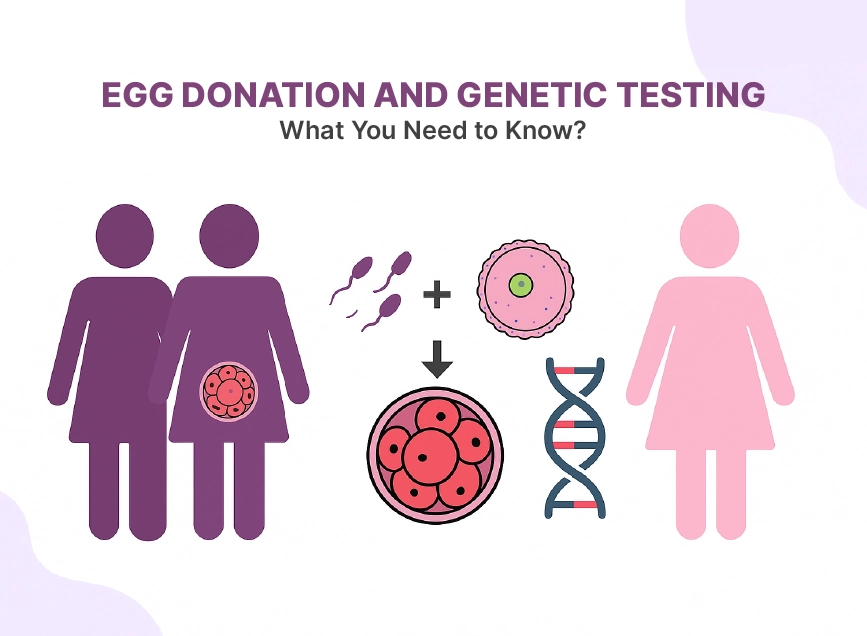
-
Posted By admin
-
-
Comments 0
Egg Donation and Genetic Testing have become transformative options for couples facing fertility challenges due to age, health conditions or genetic factors. Donor eggs offer a viable path to conception, while genetic testing ensures embryo health and minimizes the risk of genetic disorders. This practice is growing globally, especially in Mumbai, where egg donation programs in Mumbai and fertility banks provide essential support. In this blog, we’ll explore how egg donation works, the role of genetic testing, and how these services are reshaping fertility treatments in Mumbai.
What is Egg Donation?
Egg donation involves a woman donating her eggs to another woman or couple who cannot use their eggs due to infertility or genetic conditions. The eggs are retrieved from the donor, fertilized with the sperm of the intended father (or sperm donor) through in vitro fertilization (IVF) and then implanted into the recipient’s uterus. This process offers hope to individuals facing infertility due to factors such as:
- Age: A woman’s fertility naturally declines with age, especially after 35.
- Premature ovarian failure: Some women experience early menopause or ovarian failure.
- Genetic conditions: Certain inherited genetic disorders can impact egg quality.
- Medical conditions: Conditions such as polycystic ovary syndrome (PCOS) or damage from chemotherapy can reduce fertility.
The oocyte donation process allows women to receive eggs from healthy donors, providing a path to parenthood. Egg donors undergo thorough screening to ensure physical and mental health, with criteria like age limits (21-34), good health, and a clean medical history. In cities like Mumbai, egg donation programs and reputable fertility banks and art banks in Mumbai offer vital support for individuals seeking fertility treatments.
The Role of Genetic Testing in Egg Donation
Egg Donation and Genetic Testing have become a critical tool to assess the quality of both the donor’s eggs and the health of the resulting embryos. This type of testing ensures that the embryo has the best possible chance of developing into a healthy baby and reduces the risks of passing on inherited conditions.
1. Genetic Screening of the Egg Donor
Before donating eggs, the donor is typically subjected to genetic screening to identify any potential hereditary diseases or chromosomal abnormalities. These tests can detect conditions like:
- Cystic fibrosis
- Tay-Sachs disease
- Sickle cell anemia
- Fragile X syndrome
Some clinics also conduct tests for carriers of common genetic disorders depending on the population’s ethnicity or family history. By identifying these conditions early, the female egg donors in Mumbai can be matched with the recipient’s medical history, minimizing the risk of passing on serious genetic disorders to the child.
2. Embryo Genetic Testing: Preimplantation Genetic Testing (PGT)
Once the eggs are fertilized through IVF, the next step involves creating embryos. These embryos are then tested for genetic health through a process called preimplantation genetic testing (PGT), which includes:
- PGT-A (for aneuploidy): This test screens embryos for chromosomal abnormalities (like Down syndrome) that could result in miscarriage or developmental issues.
- PGT-M (for monogenic disorders): This test identifies single-gene disorders, such as cystic fibrosis, sickle cell anemia, and Huntington’s disease.
- PGT-SR (for structural rearrangements): This test identifies structural changes in chromosomes, such as deletions or duplications, that could lead to infertility or genetic disorders.
PGT allows doctors and patients to choose the healthiest embryos for implantation, significantly improving the chances of a successful pregnancy and reducing the risk of miscarriage or genetic disorders.
3. Genetic Counseling for Intended Parents
Once the genetic screening and embryo testing are complete, many fertility clinics offer genetic counseling to intended parents. This counseling session helps parents understand the results of the genetic tests and what they mean for their family planning.
It’s important to note that while genetic testing can significantly reduce the risk of passing on genetic disorders, no test can guarantee a 100% healthy embryo. However, it provides valuable insights that can aid in making informed decisions about which embryos to implant.
The Importance of Donor-Recipient Matching
Matching the right egg donor with the intended recipient is crucial in the egg donation process. Factors like physical traits (e.g., eye color, height) and cultural background help recipients feel more connected. Some clinics offer personalized donor selection, while others provide anonymous donations. With the growing availability of fertility banks and art banks in Mumbai, which offer screened and healthy donors, intended parents can benefit from higher IVF success rates, with genetic testing minimizing the risks of congenital disorders.
To Conclude
Egg Donation and Genetic Testing have become essential components of modern fertility treatments, offering hope to those facing challenges in conceiving. Genetic testing helps identify potential hereditary conditions by screening both the donor and the embryos, significantly improving the chances of a healthy pregnancy. For individuals considering an egg donation program in Mumbai, understanding the role of genetic testing is crucial for making informed and confident decisions. While it doesn’t guarantee a perfect outcome, it provides clarity and reassurance during the fertility journey. Together, Egg Donation and Genetic Testing ensure that families are built on a foundation of health and trust.






